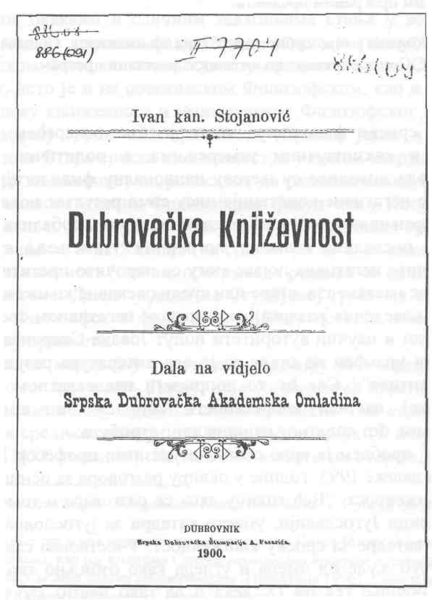|
Frano Kulišić
Frano Kulišić ( sr-Cyrl, Франо Кулишић; 4 December 1884 - 18 October 1915) was a literary historian. He was a member of the Serb-Catholic movement in Dubrovnik. He was an active member of Serbian literary society ''Matica srpska'' in Dubrovnik. Biography Frano Kulišić was born in Dubrovnik, Austria-Hungary, and graduated from the Dubrovnik Gymnasium in 1903, studied Slavic studies in Vienna in 1909 and wrote the thesis "Dživo Bunić Vučićević: Ein literarhistorischer Beitrag zur lyrischen Poesie des 17. Jahrhunderts" published in Ragusa. Kulišić was the first custodian of the Baltazar Bogišić memorial collection in 1909. During his studies he ran the library of Vatroslav Jagić. He was the secretary of the Matica srpska in Dubrovnik from 1913 to 1914. In 1913, he was the host of the celebration of Saint Blaise, the city of Dubrovnik's patron saint, one of the few Serb Catholics to be chosen for that honor at the turn of the century. Kulišić was an a ... [...More Info...] [...Related Items...] OR: [Wikipedia] [Google] [Baidu] |
Croatian Biographical Lexicon
''Croatian Biographical Lexicon'' () is a multi-volume biographical and bibliographical encyclopedia in Croatian, published by the Miroslav Krleža Institute of Lexicography. It contains biographies of prominent Croats, as well as foreigners who participated in Croatian public life and have left their mark on the history of Croatia Croatia, officially the Republic of Croatia, is a country in Central Europe, Central and Southeast Europe, on the coast of the Adriatic Sea. It borders Slovenia to the northwest, Hungary to the northeast, Serbia to the east, Bosnia and Herze .... The project was launched in the second half of the 1970s. Seven volumes have been published so far with a total of 10,218 articles (3,524 illustrations). The editor-in-chief of the first volume was Nikica Kolumbić, of the second volume Aleksandar Stipčević, and since 1990 the chief editor has been Trpimir Macan. Many of the biographies in the lexicon have been researched and published for the ... [...More Info...] [...Related Items...] OR: [Wikipedia] [Google] [Baidu] |
Saint Blaise
Blaise of Sebaste (, ''Hágios Blásios''; martyred 316 AD) was a physician and bishop of Sivas, Sebastea in historical Lesser Armenia (modern Sivas, Turkey) who is venerated as a Christian saint and martyr. He is counted as one of the Fourteen Holy Helpers. Blaise is a saint in the Catholic Church, Catholic, Western Rite Orthodoxy, Eastern Orthodox Churches, Eastern Orthodox and Oriental Orthodox Churches and is the patron saint of wool combers and of sufferers from Otorhinolaryngology, ENT illnesses. In the Latin Church, his feast falls on 3 February. In the Eastern Churches, it is on 11 February. According to the ''Acta Sanctorum'', he was martyred by being beaten, combing (torture), tortured with iron combs, and beheaded. Early records The first reference to Blaise is the medical writings of Aëtius Amidenus () where his aid is invoked in treating patients with objects stuck in the throat. Marco Polo reported on the place where "Messer Saint Blaise obtained the glorious cr ... [...More Info...] [...Related Items...] OR: [Wikipedia] [Google] [Baidu] |
19th-century Serbian Historians
The 19th century began on 1 January 1801 (represented by the Roman numerals MDCCCI), and ended on 31 December 1900 (MCM). It was the 9th century of the 2nd millennium. It was characterized by vast social upheaval. Slavery was Abolitionism, abolished in much of Europe and the Americas. The First Industrial Revolution, though it began in the late 18th century, expanded beyond its British homeland for the first time during the 19th century, particularly remaking the economies and societies of the Low Countries, France, the Rhineland, Northern Italy, and the Northeastern United States. A few decades later, the Second Industrial Revolution led to ever more massive urbanization and much higher levels of productivity, profit, and prosperity, a pattern that continued into the 20th century. The Catholic Church, in response to the growing influence and power of modernism, secularism and materialism, formed the First Vatican Council in the late 19th century to deal with such problems an ... [...More Info...] [...Related Items...] OR: [Wikipedia] [Google] [Baidu] |
Writers From Dubrovnik
A writer is a person who uses written words in different writing styles, genres and techniques to communicate ideas, to inspire feelings and emotions, or to entertain. Writers may develop different forms of writing such as novels, short stories, monographs, travelogues, plays, screenplays, teleplays, songs, and essays as well as reports, educational material, and news articles that may be of interest to the general public. Writers' works are nowadays published across a wide range of media. Skilled writers who are able to use language to express ideas well, often contribute significantly to the cultural content of a society. The term "writer" is also used elsewhere in the arts and music, such as songwriter or a screenwriter, but also a stand-alone "writer" typically refers to the creation of written language. Some writers work from an oral tradition. Writers can produce material across a number of genres, fictional or non-fictional. Other writers use multiple media such a ... [...More Info...] [...Related Items...] OR: [Wikipedia] [Google] [Baidu] |
1915 Deaths
Events Below, the events of World War I have the "WWI" prefix. January *January – British physicist Sir Joseph Larmor publishes his observations on "The Influence of Local Atmospheric Cooling on Astronomical Refraction". *January 1 ** WWI: British Royal Navy battleship HMS Formidable (1898), HMS ''Formidable'' is sunk off Lyme Regis, Dorset, England, by an Imperial German Navy U-boat, with the loss of 547 crew. **WWI: Battle of Broken Hill: A train ambush near Broken Hill, Australia, is carried out by two men (claiming to be in support of the Ottoman Empire) who are killed, together with four civilians. * January 5 – Joseph E. Carberry sets an altitude record of , carrying Capt. Benjamin Delahauf Foulois as a passenger, in a fixed-wing aircraft. * January 12 ** The United States House of Representatives rejects a proposal to give women the right to vote. ** ''A Fool There Was (1915 film), A Fool There Was'' premières in the United States, starring Theda Bara as a '' ... [...More Info...] [...Related Items...] OR: [Wikipedia] [Google] [Baidu] |
1884 Births
Events January * January 4 – The Fabian Society is founded in London to promote gradualist social progress. * January 5 – Gilbert and Sullivan's comic opera '' Princess Ida'', a satire on feminism, premières at the Savoy Theatre, London. * January 7 – German microbiologist Robert Koch isolates '' Vibrio cholerae'', the cholera bacillus, working in India. * January 18 – William Price attempts to cremate his dead baby son, Iesu Grist, in Wales. Later tried and acquitted on the grounds that cremation is not contrary to English law, he is thus able to carry out the ceremony (the first in the United Kingdom in modern times) on March 14, setting a legal precedent. * January – Arthur Conan Doyle's anonymous story " J. Habakuk Jephson's Statement" appears in the ''Cornhill Magazine'' (London). Based on the disappearance of the crew of the '' Mary Celeste'' in 1872, many of the fictional elements introduced by Doyle come to replace the real event ... [...More Info...] [...Related Items...] OR: [Wikipedia] [Google] [Baidu] |
Pneumonia
Pneumonia is an Inflammation, inflammatory condition of the lung primarily affecting the small air sacs known as Pulmonary alveolus, alveoli. Symptoms typically include some combination of Cough#Classification, productive or dry cough, chest pain, fever, and Shortness of breath, difficulty breathing. The severity of the condition is variable. Pneumonia is usually caused by infection with viruses or bacteria, and less commonly by other microorganisms. Identifying the responsible pathogen can be difficult. Diagnosis is often based on symptoms and physical examination. Chest X-rays, blood tests, and Microbiological culture, culture of the sputum may help confirm the diagnosis. The disease may be classified by where it was acquired, such as community- or hospital-acquired or healthcare-associated pneumonia. Risk factors for pneumonia include cystic fibrosis, chronic obstructive pulmonary disease (COPD), sickle cell disease, asthma, diabetes, heart failure, a history of smoking, ... [...More Info...] [...Related Items...] OR: [Wikipedia] [Google] [Baidu] |
Dušan Silni
Dušan ( sr-Cyrl, Душан) is a Slavic given name primarily used in the former Yugoslavia and the former Czechoslovakia. The name is derived from the Slavic noun ''duša'' "soul". Occurrence In Serbia, it was the 29th most popular name for males, as of 2010. People *Stefan Uroš IV Dušan, Emperor of the Serbian Empire *Dušan Bajević (born 1948), Bosnian former footballer and current football manager *Dušan Bařica (born 1975), Czech ice hockey player *Dušan Basta (born 1984), Serbian footballer * Dušan Bavdek (born 1971), Slovenian composer * Dušan Bogdanović (born 1955), Serbian-born American composer and classical guitarist * Dusan Djuric (born 1984), Swedish international footballer of Serbian descent *Dušan Domović Bulut (born 1985), Serbian 3x3 basketball player *Dušan Džamonja (1928–2009), Croatian sculptor *Dušan Fitzel (born 1963), Slovak footballer and football manager *Dušan Galis (born 1949), Slovak footballer and football manager * Dušan Keketi ... [...More Info...] [...Related Items...] OR: [Wikipedia] [Google] [Baidu] |
Vatroslav Jagić
Vatroslav Jagić (; July 6, 1838 – August 5, 1923) was a Croatian scholar of Slavic studies in the second half of the 19th century. Life Jagić was born in Varaždin, where he attended the elementary school and started his secondary-school education. He finished that level of education at the Classical Gymnasium in Zagreb. Having a particular interest in philology, he moved to Vienna, where he was lectured in Slavic studies under the guidance of Franz Miklosich. He continued his studies and defended his doctoral dissertation ''Das Leben der Wurzel dê in den slavischen Sprachen'' 'The Life of the Root dê in Slavic Languages''in Leipzig (Germany) in 1871. Upon finishing his studies, Jagić returned to Zagreb, where from 1860 to 1870 he worked as a professor at the Zagreb Gymnasium. In 1869, Jagić was elected a full member of the Yugoslav Academy of Sciences and Arts, and a correspondent member of the Russian Academy of Sciences in Saint Petersburg. Next year, 187 ... [...More Info...] [...Related Items...] OR: [Wikipedia] [Google] [Baidu] |
Serb-Catholic Movement In Dubrovnik
The Serb-Catholic movement in Dubrovnik ( sh-Cyrl-Latn, separator=" / ", Дубровачки србокатолички покрет, Dubrovački srbokatolički pokret) was a cultural and political movement of people from Dubrovnik who, while Catholic, declared themselves Serbs, while Dubrovnik was part of the Habsburg-ruled Kingdom of Dalmatia in the 19th and early 20th centuries. Initially spearheaded by intellectuals who espoused strong pro-Serbian sentiments, there were two prominent incarnations of the movement: an early pan-Slavic phase under Matija Ban and Medo Pucić that corresponded to the Illyrian movement, and a later, more Serbian nationalist group that was active between the 1880s and 1908, including a large number of Dubrovnik intellectuals at the time. The movement, whose adherents are known as Serb-Catholics () or Catholic Serbs (), largely disappeared with the creation of Yugoslavia. Background Ragusa was founded in the 7th century by refugees from Epidaurum ... [...More Info...] [...Related Items...] OR: [Wikipedia] [Google] [Baidu] |
Hrčak
The University Computing Centre in Zagreb (, abbreviated SRCE, which also means "heart") has a long tradition in the area of information and communication technologies. It was founded in 1971 within the University of Zagreb, the only Croatian university at the time, with the purpose to enhance the implementation of information technologies in the academic community as well as in Croatia in general. Today, SRCE is the main computing centre and the architect of the e-infrastructure, covering both the University of Zagreb and the whole research and high education system. Furthermore, SRCE is the competence center for information and communication technologies as well as the center for education and support in the area of ICT application. Mission The University Computing Centre – SRCE provides support to the academic community in building the information society in the Republic of Croatia through the implementation of the latest information and communication technologies, high qua ... [...More Info...] [...Related Items...] OR: [Wikipedia] [Google] [Baidu] |






